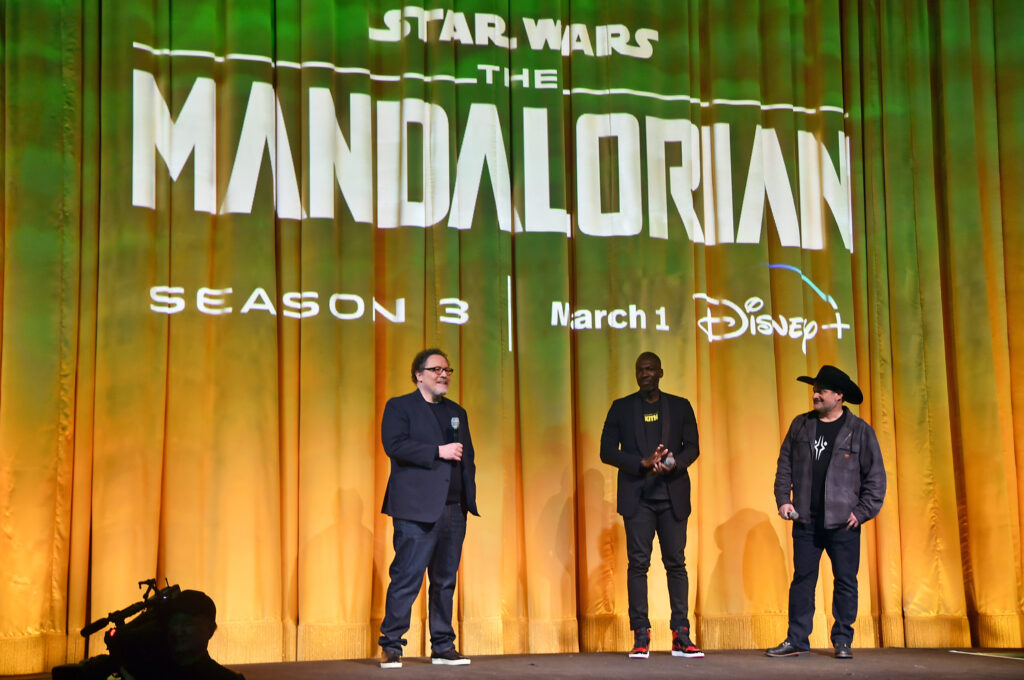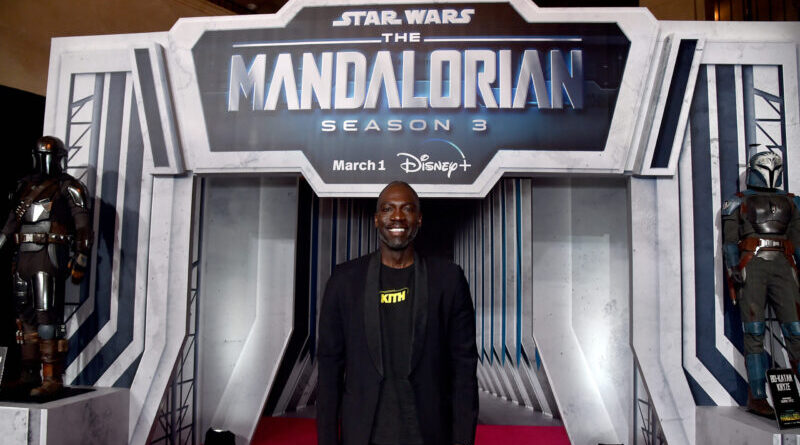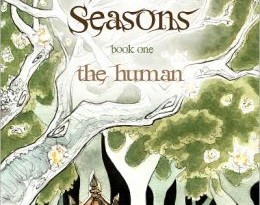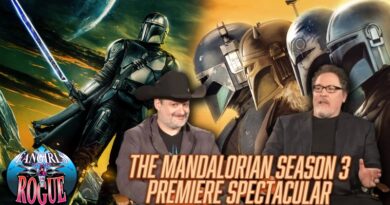Executive Producer Rick Famuyiwa On Complicated Stories in The Mandalorian

Before The Mandalorian Season 3 premiere, Fangirls Going Rogue joined our fellow Star Wars podcasters in a roundtable interview with Rick Famuyiwa, who executive produces this season and directs the first episode “The Apostate.” It is obvious Jon Favreau and Dave Filoni have trusted Famuyiwa’s instincts. After strong directing turns in first season episodes “The Child” and “The Prisoner,” he wrote and directed “The Believer,” a pivotal story beat in Season 2. In “The Believer” Din first removes his helmet, breaking the creed he swore to The Armorer’s Mandalorian sect. The events of Season 3’s “The Apostate” deal with Din’s quest to redeem himself in the eyes of his covert.
Portions of this interview were edited for clarity.
Sarah Woloski with Fangirls Going Rogue: It is so amazing to talk with you. And I loved when Din took off his helmet for the first time in “The Believer” episode, which you directed. This new season is going to follow Din’s journey because of the repercussions of those moments. So I’d love for you to talk about why removing that helmet is so crucial to Din’s journey in The Mandalorian.
Rick Famuyiwa: Din Djarin as a character was introduced to us as The Mandalorian. We didn’t even know his name. We didn’t have any idea about who he was or his background. But we knew he had this creed and this belief system that was built around being Mandalorian. And the helmet and the removal of the helmet was so instrumental to that creed.
And so I think in terms of who he is as a character because of this bounty, from the moment he got this bounty and it was revealed what it was, it’s completely re-wired his ideas about all of it. Both his identity as a bounty hunter, but then his identity as a Mandalorian.
When we were coming to that episode, knowing that with that, there would have to come a time when those beliefs came up against reality, came up against sort of what he needed to do, particularly to protect this child. Wshat would he do in that circumstance if he had to take off this
So I think he made that choice. I think he made the right choice. But obviously, even sometimes when we make the right choices, it has repercussions that reverberate beyond. So I think in this case, and as we begin the season, that’s exactly where we are. And even though he has this child now in his care in a more permanent way, those decisions for those who brought him in that covert, who took him in, are still going to have lasting consequences, which Din Djarin has to now find a way to atone for.
Skytalkers Podcast: Our question is, your episode of The Mandalorian have been some of our favorites in the past. What themes or concepts are you most excited to explore when you take on a new episode?
RF: I’m always trying to find a bit of complication in the episodes that I do. Or something that feels like I can explore a larger thematic idea, even though it’s within the context of this world that’s very, very different than the one we live in. So what I liked about my second episode was this bounty hunter was faced with the decision he made that he’s going to now have to face this this child and what this child means as he now has to deliver it to wherever he needs to deliver it to, and how that changes his ideas of the world. And then that obviously culminates in, when he takes off his helmet for this kid for the same reason. But that episode was very much starting to plant the seeds of, well, what are our beliefs? What do we really stand for? And if we only stand for them when they’re convenient, then are they really truly our beliefs?
Then he got challenged in some ways by the unlikeliest character in Mayfeld, Bill Burr, in that episode. I think this season becomes sort of a continuation of that conversation now that we see not only he as a Mandalorian has a certain set of beliefs, but we know that there are other Mandalorians like Bo-Katan and her crew that have a different sort of idea of what that is. How those come together and what that means when those ideas that are so very different have to then sort of intermingle.
That sort of complication has always been really fascinating for me, and this season certainly has a lot of that, that we will expand on. And so that, I think, is really the kind of stuff that I like to really get involved in as a director and a filmmaker.
Skywalking Through Neverland: For the episode that you directed for season three. Was there a particular musical direction you gave Joseph Shirley that you can tease us with?
RF: First of all, I think Joe’s work on this has been phenomenal. And obviously, he’s worked with Ludwig and been a part of that, and sort of continues on those themes that were built. But also just because of the size and scope and scale of this season — I think they’ve all been been big in their own right — but this certainly has a very cinematic feel to it. So I think what Joe has done throughout the season is build upon that. And some of those themes feel very much like the ones that we know and love and are familiar with, because just the scale of the show now sort of warranted something like that. So I do feel like we’re feeling some of the opera this time, this season ar
Father Son Galaxy: Your episodes in The Mandalorian have been praised for their ability to capture the spirit and the essence of the Star Wars universe. What do you think are some of the key elements of your episodes that make them resonate so strongly with the audience? How do you balance the expectations of diehard fans with the need to appeal to a wider audience?
RF: Oh, wow, quite a question. I don’t know if I have a specific answer because I think for me, when I approach it, I don’t approach it like it’s Star Wars. Because I think what I loved about this this world, and what was so special, is that it felt very real and grounded. These characters were real to me and the things they were dealing with — in terms of family, in terms of just sort of adventure, in terms of just the call to want to make change — all felt so real to me.
So that was all put into this world that was one conceived by George. That had all this technology and all these different alien species, and it had the Force and it had Jedi. But ultimately the stories were about these people. And so my approach has always been that. I’m
And then hopefully all the things that make Star Wars what it is enhances that. That’s always been my approach, let me just tell this story. And then hopefully it resonates. And then I think for me, being a fan of the original and just what George Lucas was able to create, I’ve always just tried to be true to that.
And George sort of created this story that was about this particular galaxy. But he was living in a world that was very real, and those themes and ideas were coming through in the work he was doing. And so I think in the same way, that’s what I’m trying to do as I approach each episode or the work that I’m doing, is it sort of relates to me in a way that’s very real.
And I think that’s what makes Star Wars, Star Wars. At the end of the day, it’s still real people, even though it’s it’s in a galaxy far away. So that’s always been my approach.
Full of Sith: I read in an interview that you did that the different directors always bring something of their own to the table for each episode of the show. And one of the things I’ve always really been fascinated by are the cinematic influences. When we talked to Jon Favreau and Dave Filoni earlier today, they talked about Paper Moon and Seven Samurai, and I know you kind of come from a different world of filmmaking maybe sometimes than they might. What stuff are you falling back on? What influences or inspires you as you’re sitting down to work on your episodes in Season Three?
RF: Look, a lot of those influences are universal, and they were the same things that that influenced me as a filmmaker. And certainly, as George was creating Star Wars influenced him. But I don’t necessarily, and I don’t always, look at specific films or genres as a touch point.
But there were a couple of things, especially in past seasons that I really sort of looked at as I was thinking about my episodes. In Season One, Episode Two, “The Child,” I was really thinking about The Kid, the Charlie Chaplin film, because in many ways I was telling this story with very little dialog. I think the first half of episode, there’s not one word of dialogue spoken. And so how do you tell this story about this relationship when you don’t have words to help you? And so I went back and looked at a lot of those films, and particularly that one.
And so that became an influence. And then as I was thinking about writing again my episode, Season Two, I was thinking a lot about Wages of Fear. This film that I’d seen about these men who transport nitroglycerin.
So there was something about how, because they were in these life or death circumstances, these people who often were from different points of view, in those moments were sort of free of fear. They could kind of reveal themselves to each other. And so I think for Mando and Mayfeld being on a similar kind of adventure, I felt could be an interesting way to sort of challenge Mando’s ideas from someone who probably wouldn’t be able to challenge him otherwise.
And so for this season, there’s not necessarily one film or thought that I have in mind, but I do think about these themes. About what defines us? What is our ideology? How does that define us individually? But then what does it mean to be a part of a larger group? And some of those ideas are going to be revisited here this season.
And I’m really excited about those bigger picture ideas around the Mandalorians as we get into Season Three that are have been seeded, but now are really going to come to the real fruition. But I don’t necessarily have a specific movie in mind, but I think that’s really where this season is.
Coffee with Kenobi: One of my favorite things about the behind the scenes of the first season. I like hearing about the production and you all sitting together in that roundtable. If you could talk about your role in the production of the show and how it’s evolved this season and how does that impact your role as a director?
RF: What’s been incredible about this experience is, of course, my Star Wars fandom and geekdom has been thoroughly expressed. But really, the environment that was created by Jon Favreau and Dave Filoni as this show was coming together, really set the tone for the experience of making this story. It was so collaborative and so open. He was so open to each director bringing their point of view to the larger storytelling that it really created a sort of a family dynamic in terms of how these stories come together.
It didn’t feel like you’re sort of passing a story from one person to another, but everyone was sort of telling the same story and sort of understood. And there was a unique way that that first season came together because we were all sort of new to the technology and sort of had to really know what everyone else was doing. And that informed the process moving forward. So because it’s always been that, and Jon has sort of been the one who has done most of the writing, if not all of it, it doesn’t have the feel of what I guess would be traditional television. So it’s always felt very collaborative in that way.
So as my role expanded specifically because I was also writing. And after the first episode I directed Jon asked me to do another episode, and also write on it. I’ve had the opportunity to sort of be a part of his process, in that process as he’s been writing and thinking about the seasons as they’re coming together. And that was the case in Season Two. He asked me to write an episode. And so that meant, hearing and talking to him about his process and what he was bringing together, and talking to Dave and trying to make sure it all lined up as I was writing because it wasn’t like a traditional writer’s room.
We all had to be aligned in what we were writing. So it helped me sort of see the overall arc of storytelling. So this season has been sort of a natural progression of that, now that I’m coming on both as a director but also executive producer, being able to have been a part of that process in Season One and now it’s sort of expanded in a way that there’s trust between the three of us. Trust between myself and Jon. And as the show just got bigger and bigger, it’s something that I think we all, having been a part of it from the beginning, needed to all get our arms around. So I sort of expanded my role in that way. But in some ways it still feels very familiar to what we’ve been doing since in Season One.
Related
Check out our interview with Dave Filoni and Jon Favreau
Check out our interview with Katee Sackhoff.
- Hyperspace Theories: SKELETON CREW Ahoy! - December 29, 2024
- Hyperspace Theories: WICKED Part I Rises to the Moment - December 6, 2024
- Columbia’s Vader™ Collection Launches Dec 5 - November 27, 2024











Pingback:Jon Favreau and Dave Filoni on The Mandalorian Season 3 – FANgirl Blog
Pingback:Katee Sackhoff Hints At Bo-Katan’s Age in The Mandalorian – FANgirl Blog
Pingback:Fangirls Going Rogue Speak to Jon Favreau, Dave Filoni, and Rick Famuyiwa – FANgirl Blog